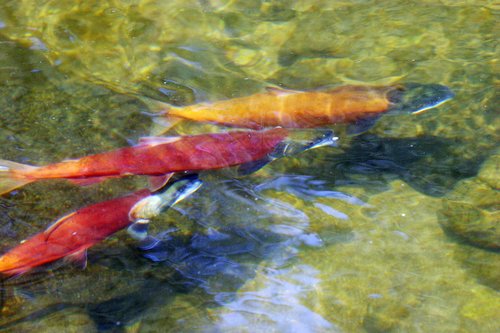forum
library
tutorial
contact

Make a Memory of the Red Fish:
Take Your Children
by Editorial BoardIdaho Mountain Express, September 16, 2009
|
the film forum library tutorial contact |

|
Make a Memory of the Red Fish:
by Editorial Board |
 A miracle has been quietly under way in the mountains of Central Idaho.
A miracle has been quietly under way in the mountains of Central Idaho.
The red fish are back in Redfish Lake.
No one has seen that sight for 53 years.
The lake's namesake is the sockeye salmon, which was nearly extinct in the Stanley Basin.
In 1990, no sockeye returned. In 1991, just a single male nicknamed Lonesome Larry made the arduous journey back from the Pacific Ocean. By 2007, four pitiful sockeye made it.
This year, a remarkable 700 fish returned to the Sawtooth Hatchery, and 250 were released into Redfish Lake last week to spawn naturally.
No one really knows why returning sockeye numbers have shot up in the last two years. Theories range from good snowpacks that put more water in the rivers to more favorable ocean conditions.
Still, the higher runs mark a successful collaboration between scientists and Mother Nature. They wouldn't have happened if Sawtooth Hatchery technicians hadn't harvested eggs and sperm from returning sockeye to generate the smolts that nature transformed into the majestic masters of the upstream swim that made it home this year.
The return of the sockeye gives us hope that species on the brink of disappearing can be restored and that the damage humans have done to the natural environment can be repaired.
Not only do the sockeye offer hope, but for people who happen to visit Redfish Lake this fall, they offer an unprecedented opportunity to see the fish in their native habitat more than a half century after going missing. The sockeyes' startling red-orange color will make them easy to see as they spawn through October.
It may be as important for people to see the fish as it is for the fish to spawn.
As wild species of mammals, fish and birds have declined and as people have become enthralled by the electronic wonders of the Digital Age, the connection between people and wildlife has become a slender, unraveling thread.
In his 2005 book, "Last Child in the Woods," author Richard Louv described what he calls "nature deficit disorder." He said the modern trend to spend scant time outdoors threatens not only the planet, but mankind's peace of mind.
He wrote, "No child can truly know or value the outdoors if the natural world remains under glass, seen only through lenses, screens, or computer monitors."
The sight of the red fish inspires wonder and reverence for the amazing creatures that spring from the mysterious power of the Earth.
A single memory of the red fish in the glint of a mountain lake on a golden fall day might not save the planet or mankind, but it would be a good place to start.
Related Pages:
Rare Salmon Get Boost at Redfish by Jon Duval, Idaho Mountain Express, 9/11/9
learn more on topics covered in the film
see the video
read the script
learn the songs
discussion forum
